2023届中考英语语法专项复习之:一般现在时态课件(共24张PPT)
文档属性
| 名称 | 2023届中考英语语法专项复习之:一般现在时态课件(共24张PPT) |  | |
| 格式 | ppt | ||
| 文件大小 | 455.5KB | ||
| 资源类型 | 教案 | ||
| 版本资源 | 通用版 | ||
| 科目 | 英语 | ||
| 更新时间 | 2022-09-12 20:25:49 | ||
图片预览

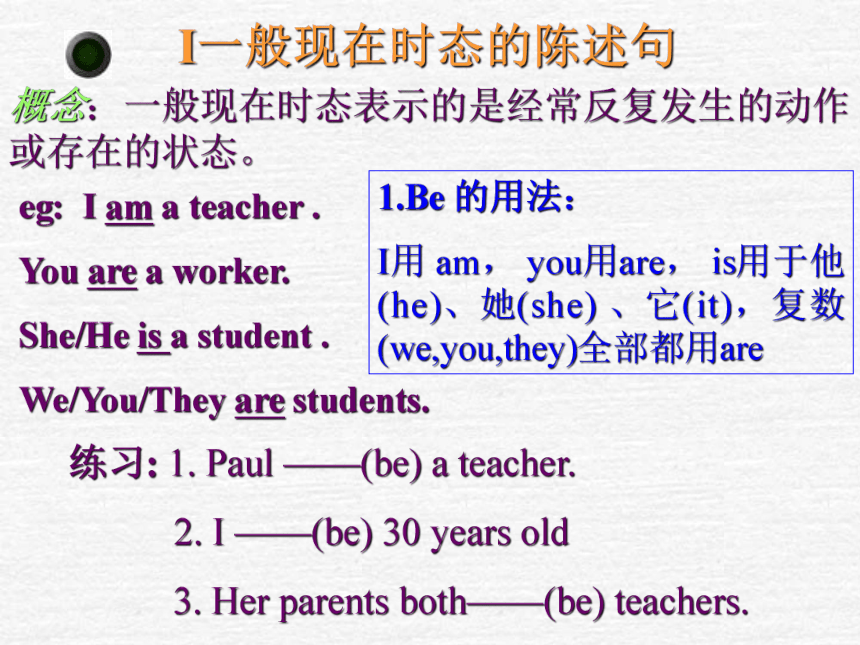
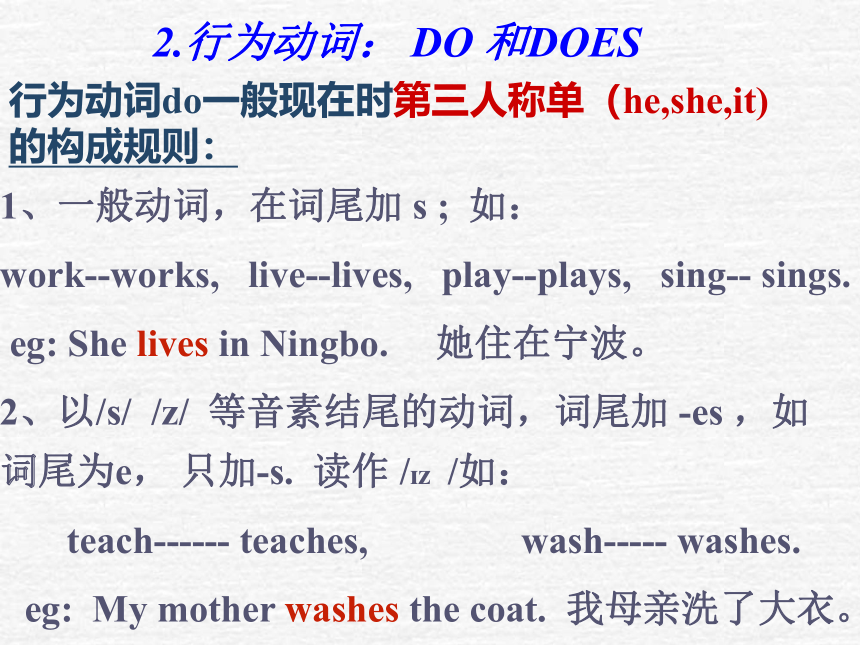
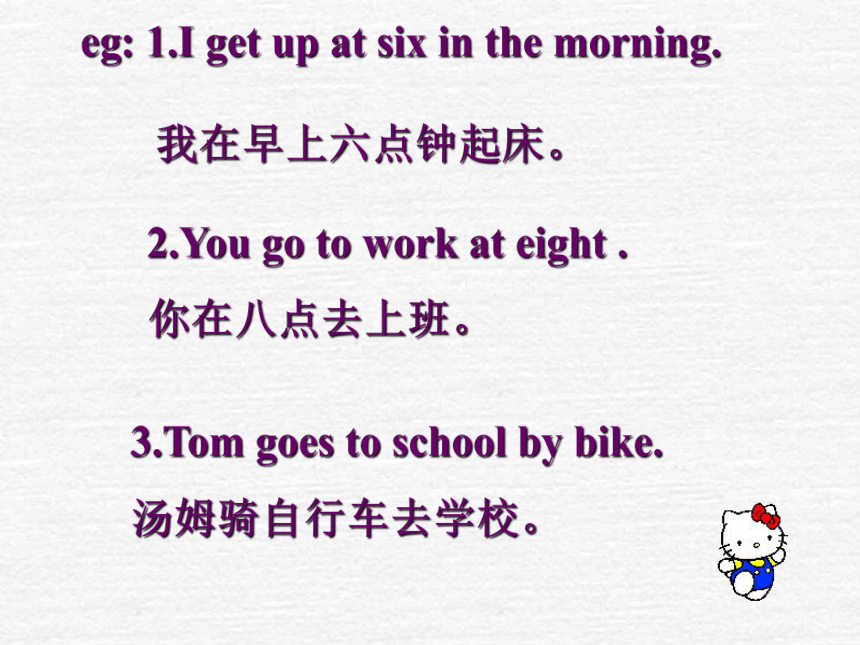

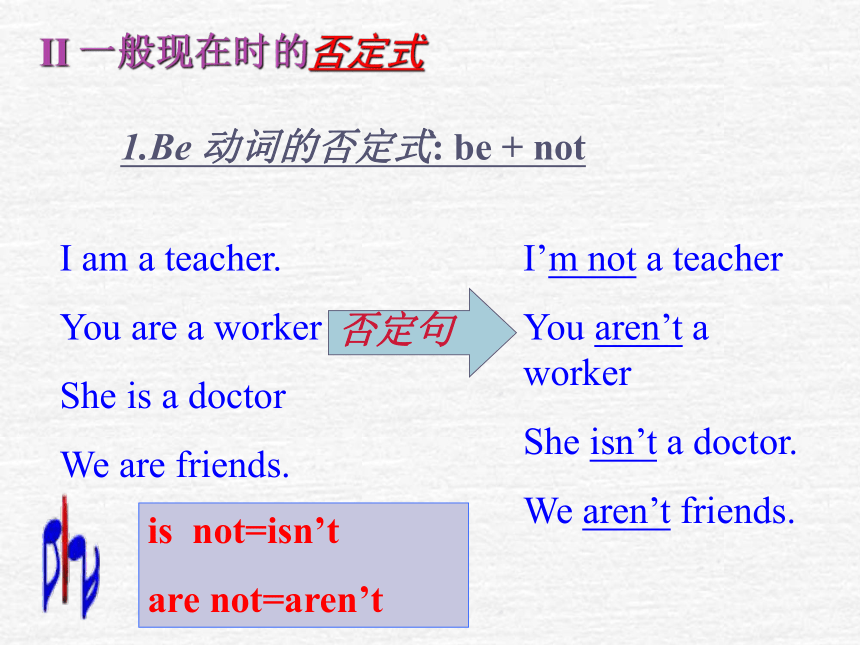
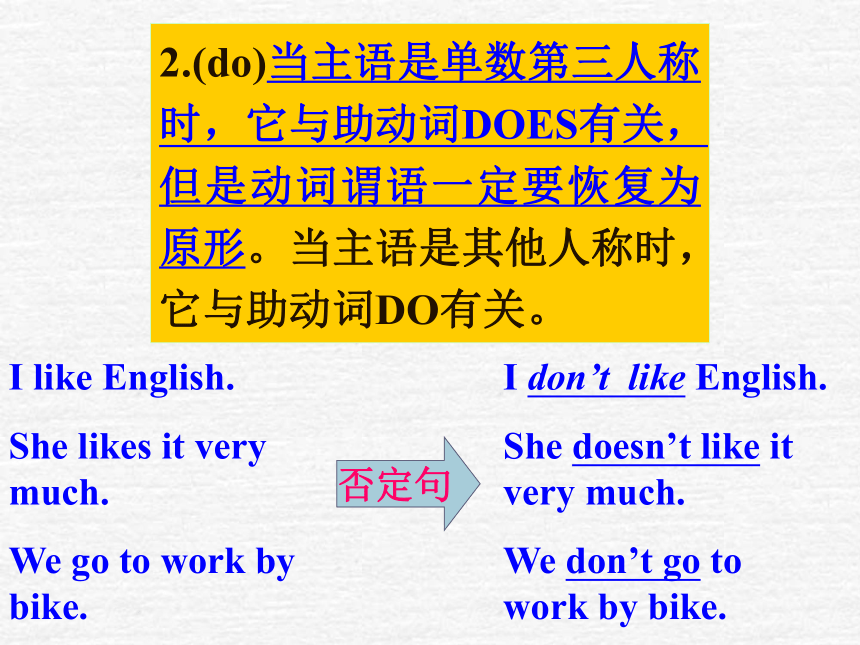
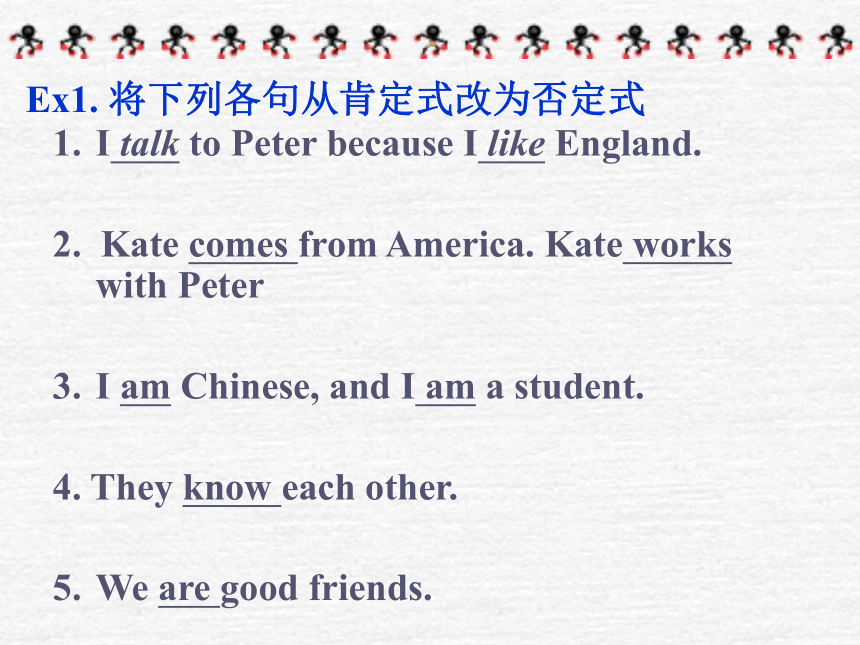
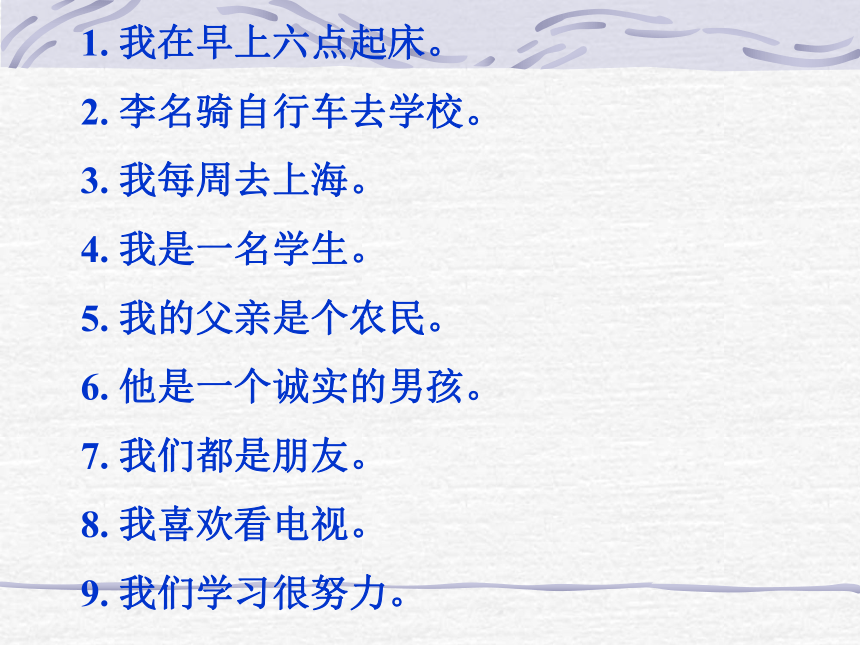
文档简介
(共24张PPT)
一般现在时态
Ⅰ.陈述句(肯定句)
Ⅱ.否定句
Ⅲ.一般疑问句
Ⅳ.特殊疑问句
Ⅴ.选择疑问句
Ⅵ.反意疑问句
Ⅰ一般现在时态的陈述句
概念:一般现在时态表示的是经常反复发生的动作或存在的状态。
eg: I am a teacher .
You are a worker.
She/He is a student .
We/You/They are students.
1.Be 的用法:
I用 am, you用are, is用于他(he)、她(she) 、它(it),复数(we,you,they)全部都用are
练习: 1. Paul ——(be) a teacher.
2. I ——(be) 30 years old
3. Her parents both——(be) teachers.
1、一般动词,在词尾加 s ; 如:
work--works, live--lives, play--plays, sing-- sings.
eg: She lives in Ningbo. 她住在宁波。
2、以/s/ /z/ 等音素结尾的动词,词尾加 -es ,如词尾为e, 只加-s. 读作 / z /如:
teach------ teaches, wash----- washes.
eg: My mother washes the coat. 我母亲洗了大衣。
行为动词do一般现在时第三人称单(he,she,it) 的构成规则:
2.行为动词: DO 和DOES
eg: 1.I get up at six in the morning.
我在早上六点钟起床。
2.You go to work at eight .
你在八点去上班。
3.Tom goes to school by bike.
汤姆骑自行车去学校。
EX2 1.Tom often___( get ) up at six in the morning
2. The earth __( go) around the sun .
3.Mary’s parent __(live ) in Beijing .
4. She ___ (draw) very well.
Ex1. 写出下列词的第三人称单数形式:
look; go; give; fly; have
looks; goes; gives; flies; has
II 一般现在时的否定式
1.Be 动词的否定式: be + not
I am a teacher.
You are a worker
She is a doctor
We are friends.
I’m not a teacher
You aren’t a worker
She isn’t a doctor.
We aren’t friends.
is not=isn’t
are not=aren’t
否定句
2.(do)当主语是单数第三人称时,它与助动词DOES有关,但是动词谓语一定要恢复为原形。当主语是其他人称时,它与助动词DO有关。
I like English.
She likes it very much.
We go to work by bike.
I don’t like English.
She doesn’t like it very much.
We don’t go to work by bike.
否定句
Ex1. 将下列各句从肯定式改为否定式
I talk to Peter because I like England.
2. Kate comes from America. Kate works with Peter
I am Chinese, and I am a student.
4. They know each other.
We are good friends.
1. 我在早上六点起床。
2. 李名骑自行车去学校。
3. 我每周去上海。
4. 我是一名学生。
5. 我的父亲是个农民。
6. 他是一个诚实的男孩。
7. 我们都是朋友。
8. 我喜欢看电视。
9. 我们学习很努力。
概念:用 yes 或 no 来回答的疑问句叫做一般疑问句。
一般疑问句句首的第一个词一般读得比较重。
III一般疑问句
I am a teacher. Are you a teacher
You are a worker. Are you a worker
He is a student. Is he a student
We are friends. Are you friends
1.对于BE 动词,疑问句要求把BE 提前,第一人称的单数和复数(I/WE),第一变成第二人称。
疑问句
2.对于实义动词,疑问句要求是:当主语是他(he),她(she),它(it)时,句子前面加DOES,并把动词恢复原形;当主语是其他人称时,句前加DO ,第一人称(I/we)换第二人称(you)。
I often go there.
You like the music.
He goes to work by bus .
We /You/They like it.
Do you often go there
Do you like the music
Does he go to work by bus
Do you/they like it
Ex1.请做练习
1.Her parents live in Shanghai .
否: Her parents____________________ in Shanghai.
疑: _______ her parents_________ in Shanghai
2.You study English .
否: You study English .
疑: you study English
3. How often Tom football
A.is ,play B. do,play C. does, play D.does,plays
Ⅳ. 特殊疑问句
特殊疑问句在考试中涉及得比较多,主要以选择和转换句型为主,首先要掌握一些常用疑问词的意思如:what(什么),when, what time(什么时间), who(谁), where(在哪里), why(为什么), how(怎样), how many+可数名词的复数(多少), how long(多长时间), how often(多久一次) 等,其次掌握它的语序,即就是特殊疑问词+一般疑问句语序(Who)除外
一、疑问词+ 一般疑问句句序:
Where are you from I’m from the north.
What do you want
I want the books on your desk.
特殊疑问句的语序
特殊疑问句的语序
二,与陈述句的语序同:(疑问词作主语或修饰主语)
Who gives you the present.
Mr. Wang gives me the present.
What is in the box
Which is mine
Whose book is on the desk
Tom goes to school every day by bike.
1.就Tom 提问
Who goes to school every day by bike
2.就goes to school提问
What does Tom do every day by bike
3.就by bike提问
How does Tom go to school every day
Ex.请做练习
Ex2. 将下列句子变成其否定句,并就斜体部分提问。
1. He likes English very much because she finds it easy.
2. She comes from American.
3. I usually go to school by bike.
4. I usually listen to the music at that park.
5. We often go to school at half past six in the morning.
1. Tom went there yesterday. Who
2. His mother is a doctor Whose
3. His father is a teacher. What
4. I have written a letter to him.what
5. I like this book very much. Which
6. I went there at ten yesterday. When
7. I live in Ningbo. Where
8. I went there by bus.
9. He is 12 years old.
10. I visit him Twice a week.
12.I paid 40 yuan for this book.
11. I bought 20 books last week.
反意疑问句,遵循的原则是 :前肯,后否;前否,后肯。其中,前否包括是带有not的否定,还包括前面句中含有否定意义的词,如seldom(很少), hardly(几乎不), never(从来也不), little, few(很少,不多) etc.
Ⅵ.反意疑问句
例如; 1. She lives in Ningbo, doesn’t she
疑问句:Does she live in Ningbo
2. They are students, aren’t they
Are they students
3. It seldom snows in Kunming, does it
Does it snow in Kunming
EG:请做下列练习.
1. The train arrives at 6.00,_________it
A. isn’t B. won’t C. doesn’t
2. They like reading books,________they
A. doesn’t B. don’t C. isn’t
3. She doesn’t go to school on Sunday , ________
A. isn’t she B. does she
C. doesn’t she D. do she
EG:请做下列练习.
4. I don’t think you are good student , __________
A. aren’t you B. do I
C. don’t I D. are you
5. She is a student , isn’t she 不,她不是
A. No, she is B. Yes , she is
C. No, she isn’t D. Yes , she is
V 选择疑问句
选择疑问句 (直接回答,与YES 和NO 无关)
1. Does she work in a factory or in an office
2. Which do you like best, football, basketball or volleyball
Eg: Does she play football or basketball
Yes, she does B. she plays football.
C. No, she doesn’t
一般现在时态
Ⅰ.陈述句(肯定句)
Ⅱ.否定句
Ⅲ.一般疑问句
Ⅳ.特殊疑问句
Ⅴ.选择疑问句
Ⅵ.反意疑问句
Ⅰ一般现在时态的陈述句
概念:一般现在时态表示的是经常反复发生的动作或存在的状态。
eg: I am a teacher .
You are a worker.
She/He is a student .
We/You/They are students.
1.Be 的用法:
I用 am, you用are, is用于他(he)、她(she) 、它(it),复数(we,you,they)全部都用are
练习: 1. Paul ——(be) a teacher.
2. I ——(be) 30 years old
3. Her parents both——(be) teachers.
1、一般动词,在词尾加 s ; 如:
work--works, live--lives, play--plays, sing-- sings.
eg: She lives in Ningbo. 她住在宁波。
2、以/s/ /z/ 等音素结尾的动词,词尾加 -es ,如词尾为e, 只加-s. 读作 / z /如:
teach------ teaches, wash----- washes.
eg: My mother washes the coat. 我母亲洗了大衣。
行为动词do一般现在时第三人称单(he,she,it) 的构成规则:
2.行为动词: DO 和DOES
eg: 1.I get up at six in the morning.
我在早上六点钟起床。
2.You go to work at eight .
你在八点去上班。
3.Tom goes to school by bike.
汤姆骑自行车去学校。
EX2 1.Tom often___( get ) up at six in the morning
2. The earth __( go) around the sun .
3.Mary’s parent __(live ) in Beijing .
4. She ___ (draw) very well.
Ex1. 写出下列词的第三人称单数形式:
look; go; give; fly; have
looks; goes; gives; flies; has
II 一般现在时的否定式
1.Be 动词的否定式: be + not
I am a teacher.
You are a worker
She is a doctor
We are friends.
I’m not a teacher
You aren’t a worker
She isn’t a doctor.
We aren’t friends.
is not=isn’t
are not=aren’t
否定句
2.(do)当主语是单数第三人称时,它与助动词DOES有关,但是动词谓语一定要恢复为原形。当主语是其他人称时,它与助动词DO有关。
I like English.
She likes it very much.
We go to work by bike.
I don’t like English.
She doesn’t like it very much.
We don’t go to work by bike.
否定句
Ex1. 将下列各句从肯定式改为否定式
I talk to Peter because I like England.
2. Kate comes from America. Kate works with Peter
I am Chinese, and I am a student.
4. They know each other.
We are good friends.
1. 我在早上六点起床。
2. 李名骑自行车去学校。
3. 我每周去上海。
4. 我是一名学生。
5. 我的父亲是个农民。
6. 他是一个诚实的男孩。
7. 我们都是朋友。
8. 我喜欢看电视。
9. 我们学习很努力。
概念:用 yes 或 no 来回答的疑问句叫做一般疑问句。
一般疑问句句首的第一个词一般读得比较重。
III一般疑问句
I am a teacher. Are you a teacher
You are a worker. Are you a worker
He is a student. Is he a student
We are friends. Are you friends
1.对于BE 动词,疑问句要求把BE 提前,第一人称的单数和复数(I/WE),第一变成第二人称。
疑问句
2.对于实义动词,疑问句要求是:当主语是他(he),她(she),它(it)时,句子前面加DOES,并把动词恢复原形;当主语是其他人称时,句前加DO ,第一人称(I/we)换第二人称(you)。
I often go there.
You like the music.
He goes to work by bus .
We /You/They like it.
Do you often go there
Do you like the music
Does he go to work by bus
Do you/they like it
Ex1.请做练习
1.Her parents live in Shanghai .
否: Her parents____________________ in Shanghai.
疑: _______ her parents_________ in Shanghai
2.You study English .
否: You study English .
疑: you study English
3. How often Tom football
A.is ,play B. do,play C. does, play D.does,plays
Ⅳ. 特殊疑问句
特殊疑问句在考试中涉及得比较多,主要以选择和转换句型为主,首先要掌握一些常用疑问词的意思如:what(什么),when, what time(什么时间), who(谁), where(在哪里), why(为什么), how(怎样), how many+可数名词的复数(多少), how long(多长时间), how often(多久一次) 等,其次掌握它的语序,即就是特殊疑问词+一般疑问句语序(Who)除外
一、疑问词+ 一般疑问句句序:
Where are you from I’m from the north.
What do you want
I want the books on your desk.
特殊疑问句的语序
特殊疑问句的语序
二,与陈述句的语序同:(疑问词作主语或修饰主语)
Who gives you the present.
Mr. Wang gives me the present.
What is in the box
Which is mine
Whose book is on the desk
Tom goes to school every day by bike.
1.就Tom 提问
Who goes to school every day by bike
2.就goes to school提问
What does Tom do every day by bike
3.就by bike提问
How does Tom go to school every day
Ex.请做练习
Ex2. 将下列句子变成其否定句,并就斜体部分提问。
1. He likes English very much because she finds it easy.
2. She comes from American.
3. I usually go to school by bike.
4. I usually listen to the music at that park.
5. We often go to school at half past six in the morning.
1. Tom went there yesterday. Who
2. His mother is a doctor Whose
3. His father is a teacher. What
4. I have written a letter to him.what
5. I like this book very much. Which
6. I went there at ten yesterday. When
7. I live in Ningbo. Where
8. I went there by bus.
9. He is 12 years old.
10. I visit him Twice a week.
12.I paid 40 yuan for this book.
11. I bought 20 books last week.
反意疑问句,遵循的原则是 :前肯,后否;前否,后肯。其中,前否包括是带有not的否定,还包括前面句中含有否定意义的词,如seldom(很少), hardly(几乎不), never(从来也不), little, few(很少,不多) etc.
Ⅵ.反意疑问句
例如; 1. She lives in Ningbo, doesn’t she
疑问句:Does she live in Ningbo
2. They are students, aren’t they
Are they students
3. It seldom snows in Kunming, does it
Does it snow in Kunming
EG:请做下列练习.
1. The train arrives at 6.00,_________it
A. isn’t B. won’t C. doesn’t
2. They like reading books,________they
A. doesn’t B. don’t C. isn’t
3. She doesn’t go to school on Sunday , ________
A. isn’t she B. does she
C. doesn’t she D. do she
EG:请做下列练习.
4. I don’t think you are good student , __________
A. aren’t you B. do I
C. don’t I D. are you
5. She is a student , isn’t she 不,她不是
A. No, she is B. Yes , she is
C. No, she isn’t D. Yes , she is
V 选择疑问句
选择疑问句 (直接回答,与YES 和NO 无关)
1. Does she work in a factory or in an office
2. Which do you like best, football, basketball or volleyball
Eg: Does she play football or basketball
Yes, she does B. she plays football.
C. No, she doesn’t
同课章节目录
- 词法
- 名词
- 动词和动词短语
- 动词语态
- 动词时态
- 助动词和情态动词
- 非谓语动词
- 冠词
- 代词
- 数词和量词
- 形容词副词及其比较等级
- 介词和介词短语
- 连词和感叹词
- 构词法
- 相似、相近词比较
- 句法
- 陈述句
- 一般疑问句和否定疑问句
- 特殊疑问句及选择疑问句
- 反意疑问句
- 存在句(There be句型)
- 宾语从句
- 定语从句
- 状语从句
- 主谓一致问题
- 简单句
- 并列句
- 复合句
- 主谓一致
- 主、表语从句
- 名词性从句
- 直接引语和间接引语
- 虚拟语气
- 感叹句
- 强调句
- 倒装句
- 祈使句
- 句子的成分
- 句子的分类
- 题型专区
- 单项选择部分
- 易错题
- 完形填空
- 阅读理解
- 词汇练习
- 听说训练
- 句型转换
- 补全对话
- 短文改错
- 翻译
- 书面表达
- 任务型阅读
- 语法填空
- 其他资料
